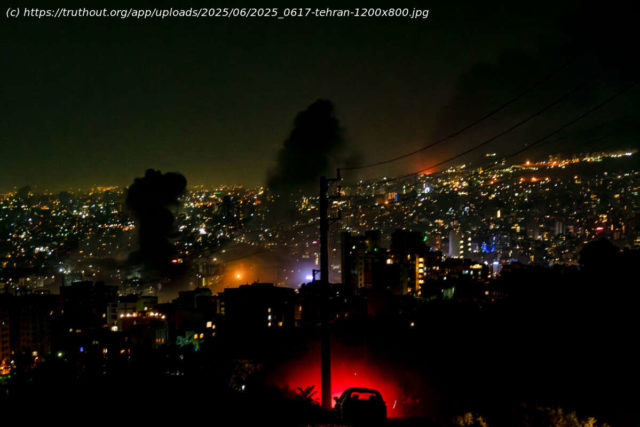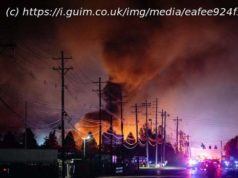Israel has killed at least 250 Iranians as it strikes residential buildings, civilian infrastructure and military bases.
On June 13, Israel launched a surprise attack on Iran. Airstrikes hit buildings across the capital, Tehran, striking residential neighborhoods as well as military sites. In just one night, close to 100 people were killed. Among the dead were dozens killed while asleep in their beds.
The attack came after eight months of calm, with not a single shot fired between Iran and Israel. Prior to the assault, Iran’s Supreme Leader, Ali Khamenei, had given his blessing for peace talks with the United States. Over this past weekend, Donald Trump’s representatives were due to meet with their Iranian counterparts to work on hashing out a deal.
And then, in the dead of night as Iranians lay asleep at home, Israel attacked.
For Iranians like Kamyar, a 29-year-old engineer living in Tehran, the massive assault came as a shock.
“I was asleep when my aunt called. There was a big explosion near her house; all her windows had shattered. She was in panic,” Kamyar told Truthout. “I opened the blinds to look out my window. I saw a flash and bang. Suddenly, all around me, I could hear explosions. The earth was shaking. That’s when I realized we were under attack.”
The New York Times and other Western media repeated the Israeli military’s line — that Israel was attacking Iran’s nuclear program. But as the sun rose over the Iranian capital, it immediately became clear that the strikes had hit residential buildings. Multiple floors of skyscrapers were blown out in Kamranieh and Nobonyad, neighborhoods on the northeast side of the city. Entire buildings were levelled in Sattarkhan, on the west side.
Videos emerged of sobbing families on the street in front of their homes, mourning loved ones killed in the strikes. Men with hands over their faces, shrieking in grief.
Israel boasted that it had killed several commanders of Iran’s Revolutionary Guard and nuclear scientists.
It also killed their families, and dozens of people who happened to live in the apartments around them. Among the dead were Amir Ali Amini, a 11-year-old taekwondo champion; Niloufar Qalehvand, a Pilates instructor; and Ehsan Eshraghi, a bank teller, and his 9-year-old daughter Baran.
As the death toll rose, shock waves went out across the Iranian capital.
“The first missiles hit just as I was saying my morning prayers,” Yasamin, a 35-year-old English teacher, told me over the phone. As she spoke, the ringing of Israeli drones in Tehran’s sky was audible. “Later, my mother found out her friend’s apartment had been bombed. Her two children were killed in bed by the attack. Everyone on the floor below them was wounded.”
“My mother has been sick ever since she heard the news,” she said, holding back tears. “We’re paralyzed in fear. I’m afraid that a bomb will kill me in my sleep.”
In the days since, Israel has bombed Iran repeatedly, with each round often only a few hours apart. This has included missile strikes on civilian infrastructure including fuel depots, oil refineries, and airports. On June 15, car bombs were detonated in downtown Tehran.
Towers across the city have had their tops blown out. Ambulances race to locate survivors in collapsed buildings.
Every morning, crowds emerge to help the wounded, digging people out from below the rubble. Others wander in a daze, shocked by how quickly their lives have turned upside down.
The last time missile barrages fell on Tehran was 1988, when Saddam Hussein was bombing the country in a war where he received Western support. That same year, a U.S. aircraft carrier shot down an Iranian airliner flying from Tehran to Dubai over the Persian Gulf, killing all 290 people aboard.
In the decades since, the city has experienced relative peace. While Israel had threatened Iran with war repeatedly, recently many hoped that Trump would fulfill his promise to avoid a new Middle East war. The shock of the sudden attack was compounded by the hope many Iranians felt about the peace process.
“Until a few months ago, it seemed like our government would refuse to negotiate with Trump,” Kamyar told me. “But then they agreed, and things were moving forward.






